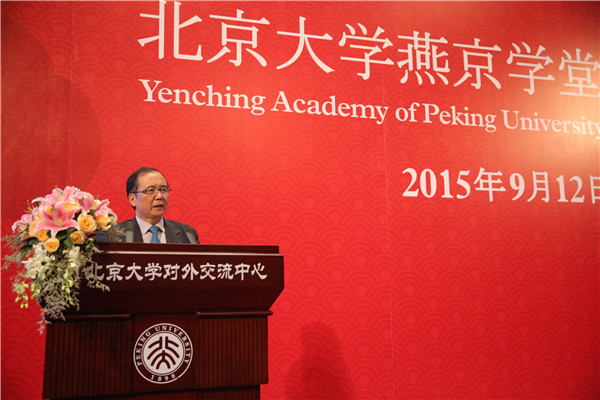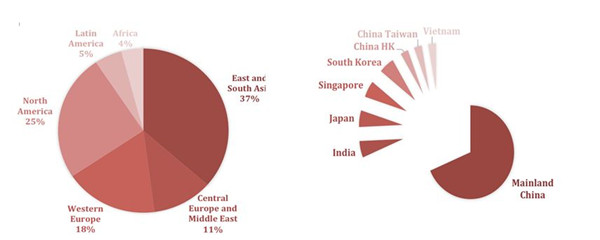September 12, 2015, marked the inaugural opening ceremony for the Yenching Academy at Peking University. Breaking new ground in China, this Master‘s in China Studies program at Peking University brings together 96 young scholars from over 30 countries. Admitted through a highly competitive selection process, the scholars will live and study together at one of the top universities in China. In this first cohort, scholars come from nationalities ranging from Armenia to Zimbabwe to study their choice of six interdisciplinary programs: international relations and politics, history and archeology, economics and management, law and society, Chinese literature, and religion and philosophy.

The opening ceremony was attended by numerous foreign dignitaries, including diplomatic and embassy representatives from seventeen countries: the United States, Germany, France, Spain, Canada, South Africa, Israel, India, Singapore, Belgium, Chile, Netherlands, Denmark, Ireland, Armenia, Romania, and Mexico.
Special guests included leaders from the Chinese Ministry of Education; the President of Peking University, Lin Jianhua; Dean of Yenching Academy Liu Wei; and Associate Deans Cai Hongbing, Wang Bo, and John Holden. President Lin said, "I trust the Yenching Academy program will provide an incredible opportunity to these young scholars to acquire in-depth understanding about China's civilization and history."
The Academy was also honored to have in attendance Mr. Ronald Chao and his wife Juliana of the Bai Xian Education Foundation, one of the major benefactors of the scholarship program.

Yenching scholars are coming to Peking University from the world's leading universities. Harvard (5), Princeton (4), Yale (3), Stanford (2), Oxford (4) and Cambridge (2) are represented by some of their top students. The Academy also has students from the finest national universities worldwide, such as Saint Petersburg State University (Russia), Leiden University (Netherlands), National Autonomous University of Mexico, Waseda University (Japan), University of Cape Town (South Africa), and Sciences Po (France). In addition, Chinese students are coming from some of the top universities in China, including Peking University.
Daniel Khalessi, a Yenching scholar and a graduate of Stanford and Yale universities said, "The Yenching Academy represents an effort to break down divisions in our world by cultivating an enabling environment for rigorous and interdisciplinary thought leadership about China's past, present, and future."

The Yenching program aspires to shape leaders with a holistic and comprehensive exploration and understanding of China. The Academy brings together students from all over the world to learn from one another, deepen their understanding of each other's cultural values, and engage each other at one of the most historically important educational institutions in China. In this sense, Yenching Academy cultivates young leaders for diverse global arenas with a unique understanding of the fundamental roots that shape China, making it a distinctly unique Chinese and international scholarship program unlike any other.

Yenching Scholars bring a diverse of range experiences and backgrounds to the program and the university:
-For his previous master's thesis, a Yenching Scholar has physically retraced Alexander The Great's steps from Greece to India. Another Chinese scholar has spent 6 months on a boat at sea, visiting over 31 countries.
-Another scholar has set up an online project aiming to analyze the ways in which Western journalism depicted the decline of the Qing Dynasty.
-Several have written in internationally renowned newspapers, such as The Guardian, Al Jazeera and BBC News.
-One scholar has created a social enterprise in Kenya, providing job opportunities to women and children affected by HIV/AIDS.
-One scholar has written the first Chinese-teaching method text for Armenian students. Another has translated and analyzed parts of the Book of Documents.
In the future, the Academy aspires to become a leading center for greater intellectual engagement, exchange, and collaboration between China and the world, drawing upon the vast resources of Peking University and bringing international scholarship and leadership to the Academy and wider university.